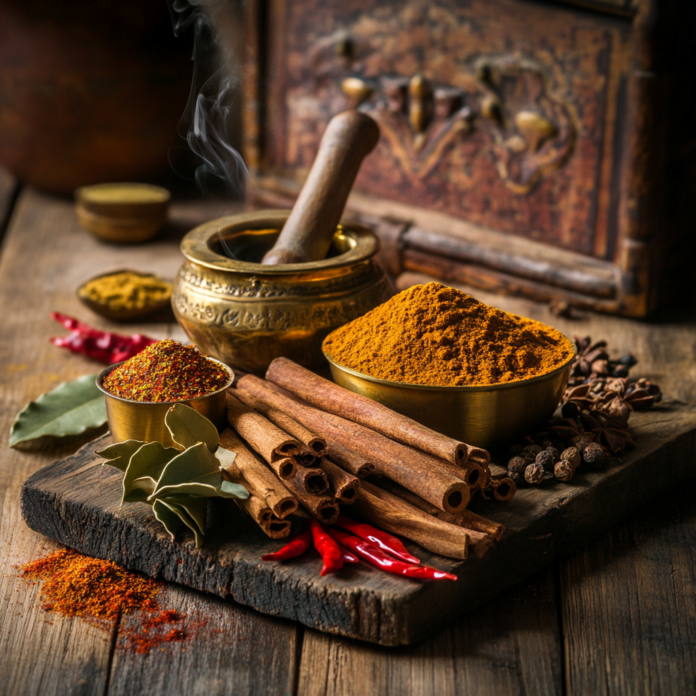Spices: today they’re humble jars in your pantry, but centuries ago, they were the stuff of legends. Wars were fought, empires rose and fell, and entire trade routes were built—all for a pinch of cinnamon or a handful of nutmeg. These little flavor powerhouses didn’t just transform food; they changed the course of history. Let’s explore how the spice trade shaped the world, what makes spices so magical, and how to use them to elevate your cooking.
Why Were Spices So Valuable?
In the Middle Ages, spices were worth their weight in gold—literally. Why?
- Exotic Origins: Spices like cinnamon, nutmeg, and cloves were grown in faraway lands like India, Indonesia, and Sri Lanka. Transporting them to Europe was costly and dangerous.
- Preservation Power: Before refrigeration, spices helped preserve food and mask unpleasant odors.
- Status Symbol: Only the wealthy could afford spices, making them a marker of power and prestige.
- Medicinal Uses: Spices were believed to cure everything from indigestion to the plague.
The Spices That Shaped the World
1. Cinnamon
- What It Is: Bark from the Cinnamomum tree, native to Sri Lanka and southern India.
- Why It Was Coveted: Ancient Egyptians used it in embalming, and medieval Europeans prized it for its warming, sweet flavor.
- Flavor Profile: Sweet, woody, and slightly spicy.
- Modern Uses: From cinnamon rolls to curries, it’s a global favorite.
- Pro Tip: Use whole cinnamon sticks in stews or mulled wine for a subtler flavor.
2. Nutmeg
- What It Is: The seed of the Myristica fragrans tree, native to the Banda Islands in Indonesia.
- Why It Was Coveted: Once thought to ward off the plague, nutmeg sparked bloody battles between European powers to control its trade.
- Flavor Profile: Warm, nutty, and slightly sweet.
- Modern Uses: Essential in béchamel sauce, pumpkin pie, and holiday drinks like eggnog.
- Pro Tip: Always grate fresh nutmeg—it’s far more aromatic than the pre-ground stuff.
3. Clove
- What It Is: Dried flower buds from the Syzygium aromaticum tree, native to the Maluku Islands (Indonesia).
- Why It Was Coveted: Its strong aroma and flavor made it a luxury item in medieval Europe.
- Flavor Profile: Sweet, pungent, and slightly bitter.
- Modern Uses: Key in spice blends like garam masala and chai, and a holiday favorite in mulled cider.
- Pro Tip: Whole cloves are potent—use sparingly in cooking to avoid overpowering the dish.
The Impact of the Spice Trade
- Birth of Globalization: The quest for spices connected Europe, Asia, Africa, and the Americas, laying the foundation for today’s global economy.
- Colonialism and Conflict: European powers like Portugal, Spain, and the Netherlands fought fiercely to control spice-rich regions, often at great human cost.
- Cultural Exchange: The movement of spices introduced new flavors and culinary traditions to different parts of the world.
Spices in Modern Cuisine
While spices no longer spark wars, they’re still essential in kitchens worldwide. Here’s how to use them like a pro:
1. Blends to Know
- Garam Masala: A warming Indian spice mix featuring cinnamon, cloves, and cardamom.
- Chinese Five Spice: A bold mix of star anise, cloves, cinnamon, Sichuan peppercorns, and fennel.
- Pumpkin Spice: A cozy blend of cinnamon, nutmeg, cloves, and ginger—yes, it’s more than just a latte trend.
2. Pairing Tips
- Cinnamon: Pairs well with apples, pork, and sweet potatoes.
- Nutmeg: Enhances creamy dishes like Alfredo sauce or rice pudding.
- Cloves: Adds depth to braised meats and baked goods.
How to Store and Use Spices
- Keep Them Fresh: Store spices in a cool, dark place in airtight containers. Heat and light can sap their flavor.
- Whole vs. Ground: Whole spices last longer and release more flavor when freshly ground. Invest in a mortar and pestle or spice grinder.
- Toast for Flavor: Toasting spices in a dry pan before using intensifies their aroma and taste.
Spices Around the World
- India: The birthplace of spice blends like curry powder and masala, spices are central to Indian cuisine.
- Middle East: Cinnamon and cloves are key in savory dishes like tagines and rice pilafs.
- Europe: Nutmeg and cloves became staples in holiday baking and spiced wines.
- Asia: Chinese and Indonesian dishes use bold spice blends to create complex layers of flavor.
Fun Spice Facts
- Nutmeg’s Dark History: In the 1600s, the Dutch traded Manhattan to the British in exchange for control of the Banda Islands and their nutmeg supply.
- Clove Diplomacy: Ancient Chinese rulers required officials to chew cloves to freshen their breath before speaking.
- Cinnamon Secrets: Medieval traders spread myths about cinnamon being harvested from dangerous nests to inflate its value.
DIY Spice Blend: Garam Masala
Here’s a simple recipe to make your own garam masala:
- Toast 2 tsp cumin seeds, 2 tsp coriander seeds, 1 tsp cardamom pods, 1 tsp cloves, 1 cinnamon stick, and 1 tsp black peppercorns in a dry pan.
- Grind into a fine powder using a spice grinder.
- Store in an airtight jar and use in curries, soups, or roasted veggies.
Final Thoughts
Cinnamon, nutmeg, and cloves may seem like everyday pantry staples, but their journey from exotic treasures to kitchen essentials is nothing short of extraordinary. Understanding their history, flavor profiles, and uses can elevate your cooking and give you a deeper appreciation for these spices.
So the next time you sprinkle cinnamon on your oatmeal or grate fresh nutmeg into a béchamel, remember: you’re holding a piece of history. Spice up your life—literally!




